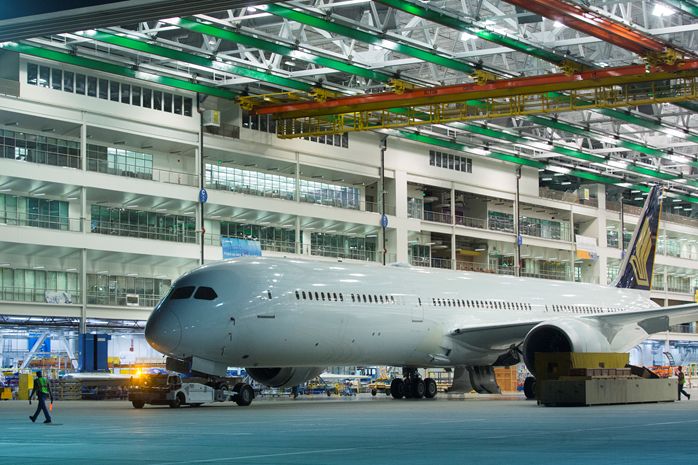 去年,波音公司(Boeing)与3D打印钛合金结构件供应商Norsk Titanium AS签订合同,意在合作生产用于波音787 Dreamliner飞机的FAA(美国联邦航空局)认证钛合金结构件(如图中的新加坡航空公司飞机所采用的结构件)。此外,总部位于特拉维夫的Assembrix公司可能将负责管理并保护这两家公司共享的知识产权(图片来源:波音公司)。
去年,波音公司(Boeing)与3D打印钛合金结构件供应商Norsk Titanium AS签订合同,意在合作生产用于波音787 Dreamliner飞机的FAA(美国联邦航空局)认证钛合金结构件(如图中的新加坡航空公司飞机所采用的结构件)。此外,总部位于特拉维夫的Assembrix公司可能将负责管理并保护这两家公司共享的知识产权(图片来源:波音公司)。
去年,波音公司(Boeing)与3D打印钛合金结构件供应商Norsk Titanium AS签订合同,意在合作生产用于波音787 Dreamliner飞机的FAA(美国联邦航空局)认证钛合金结构件(如图中的新加坡航空公司飞机所采用的结构件)。此外,总部位于特拉维夫的Assembrix公司可能将负责管理并保护这两家公司共享的知识产权(图片来源:波音公司)。
位于芝加哥总部的波音公司管理层与总部位于特拉维夫的Assembrix公司正在开展合作磋商,后者将负责管理并保护波音与全球增材制造(又称3D打印)和部件供应商之间共享的知识产权,以支持波音在商用航空、太空以及军用航空领域的发展。
Assembrix公司所提供的软件,实际上相当于一个能够实现工业3D打印虚拟化的云平台,使得3D打印生产工艺变得更为简化、安全与高效。该软件采用安全的数据传输方法,可帮助波音公司在分配工作和生产的过程中确保增材制造的设计信息不被拦截、破坏或解密。
波音公司全球20家工厂具备增材制造生产能力,同时还与全球供应商合作,生产用于商用航空、航天和国防领域的3D打印部件。 波音打算大力开发增材制造技术以实现生产系统的转型,并支持公司业务的增长,而Assembrix软件将在其过程中确保整个生产链上的信息安全。
波音公司以色列分部总裁David Ivry表示:“波音公司有意合作的全球供应商所生产的部件,应当符合严格的质量标准、时间表安排要求、成本要求与智力资本标准,而Assembrix公司则符合我们所有上述标准要求。这一合作协议既扩展了波音与以色列工业的联系,也帮助了类似Assembrix公司的企业拓展了业务。”
波音此前与瑞士的科技集团欧瑞康(Oerlikon)合作生产航天钛结构件的增材制造粉末床,其目标是实现从初始粉末管理到最终成品的整个工艺流程的标准化。去年,波音同3D打印钛合金结构件供应商Norsk Titanium AS公司签订了合同,意在合作生产安装在波音787Dreamliner飞机上、且经过美国联邦航空管理局(FAA)认证的钛合金结构件。
工业3D打印产业的不断发展,以及波音对3D打印技术的应用,使得增材制造生产与数字化服务变得日趋重要。尽管3D打印行业发展潜力巨大,但由于将3D打印技术应用于大规模生产所耗成本巨大,且3D打印所涉及的信息流技术(在军事领域被称为“数字线”)还存在一定局限性,因此对3D打印最终成品的生产起决定性作用的数字化设计尚未成为主流。
要实现增材制造业的产业化,就需要确保一条数字线能够将包括最初的设计构想与最终的成品生产在内的整个工艺流程无缝连接起来。因此,这一数字线所涉及的信息包括一个部件在设计、成型、生产与监控阶段产生的所有数据。而除此之外,要实现增材制造业产业化,并应对3D打印技术所带来的复杂挑战,相关产品生产商还必须对数字主线(即数字线)所包含的复杂运算有深入的了解。如果这期间产生的所有信息只能存储却不能分享,那么生产商就无法对整个部件的制造流程获得清晰全面的了解。
而 Assembrix公司所提供的软件,正是专门负责监督包括从最初部件建模到最终成品确认在内的整个增材制造线,方便用户对工业3D打印机进行任务分配与监督,从而实现了整个流程的全自动化与自我控制,提高了3D打印机的利用率与投资回报率。
Assembrix公司的CEO LiborPolak表示:“我们很高兴能够与波音合作,并珍视波音对我们的信任以及对我们能力的肯定。这一合作将有助于我们开发并实施创新方案以更好地连通世界,并进一步推动增材制造数字线技术的发展。”
波音与以色列的第一次合作可以追溯到70年前以色列建国时。自那以后,波音就一直同以色列商用航空与军用航空领域的客户及供应商保持着密切且长期稳定的合作关系。以色列的3D打印行业为波音供应了许多部件,应用于包括F-15战斗机、AH-64D长弓阿帕奇(Apache Longbow)、新一代箭-3(Arrow 3)导弹拦截器以及波音737飞机、777飞机与787飞机在内的波音产国防部队飞机及商用飞机。
Boeing officials in Chicago are collaborating with Tel Aviv-based Assembrix to manage and protect intellectual property (IP) shared with vendors across its global supply chain for additive manufacturing, or 3D printing, parts to support Boeing commercial aviation, space, and military platforms.
Assembrix's software is a cloud-based platform that virtualizes industrial 3D printing to enable simpler, secured, and more efficient production processes. The software will enable Boeing to transmit additive manufacturing design information using secure distribution methods to protect data from being intercepted, corrupted, or decrypted throughout the distribution and manufacturing processes.
Boeing uses additive manufacturing capabilities at 20 sites worldwide and partners with global suppliers to deliver 3D-printed parts for its commercial, space, and defense platforms. Boeing is currently leveraging and accelerating additive manufacturing to transform its production system and support the company's growth, using Assembrix software to secure its proprietary information across the supply chain.
"Boeing seeks suppliers globally who meet stringent quality, schedule, cost, and intellectual capital standards, and Assembrix does all that," says David Ivry, president of Boeing Israel. "This agreement expands Boeing's ties to Israeli industry while helping companies like Assembrix expand their business.”
Boeing previously teamed up with Swiss technology group Oerlikon to create powder bed additive manufacturing of structural titanium components for the aerospace industry with the goal of standardizing everything from initial powder management to finished product. Last year, Boeing also hired Norsk Titanium AS, a supplier of additive manufactured structural titanium components, to deliver FAA-approved structural components for installation on the Boeing 787 Dreamliner.
Boeing’s advances make protecting additive manufacturing productions and digitization of increasing importance as industrial 3D printing begins to take off. Despite the industry’s promise and potential, digital designs dictating the production of end-use 3D-printed objects have not yet moved fully into the mainstream, due to the high cost of large-scale mass production and limitations on information flow, which the military community calls the “digital thread.”
For additive manufacturing processes to scale at the industrial level, a single, seamless strand of data must stretch from the initial design concept to the finished part, constituting the information that enables the design, modeling, production, and monitoring of an individual manufactured part. The intense computing of this digital thread or data strand must be dissected and understood by the manufacturer to enhance and scale additive manufacturing and manage its complexities. If information remains siloed, the manufacturer can’t gain full visibility across the additive manufacturing process.
Assembrix will oversee the entire additive manufacturing thread from the initial part model to the verified physical part and beyond, enabling the allocation and monitoring of industrial 3D printers. The company’s efforts will likely lead Boeing to a fully automated and self-controlled process, increasing printer utilization and return on investment.
"We are pleased to partner with Boeing and value its confidence in us and in our capabilities," says Lior Polak, Assembrix CEO. "This collaboration supports our vision to develop and implement innovative solutions that connect the world and take the additive manufacturing digital thread one step forward."
The relationship between Boeing and Israel stretches back 70 years to the founding of the state of Israel. Since then, Boeing has worked closely with Israeli commercial and military customers and suppliers to develop lasting partnerships. Israeli industry supplies parts for many Boeing defense and commercial products, including the F-15, the AH-64D Apache Longbow, the next-generation Arrow 3 interceptor, and the 737, 777, and 787 airplanes.
Author: Anna Fiorentino
Source: SAE Aerospace Engineering Magazine
等级
打分
- 2分
- 4分
- 6分
- 8分
- 10分
平均分
